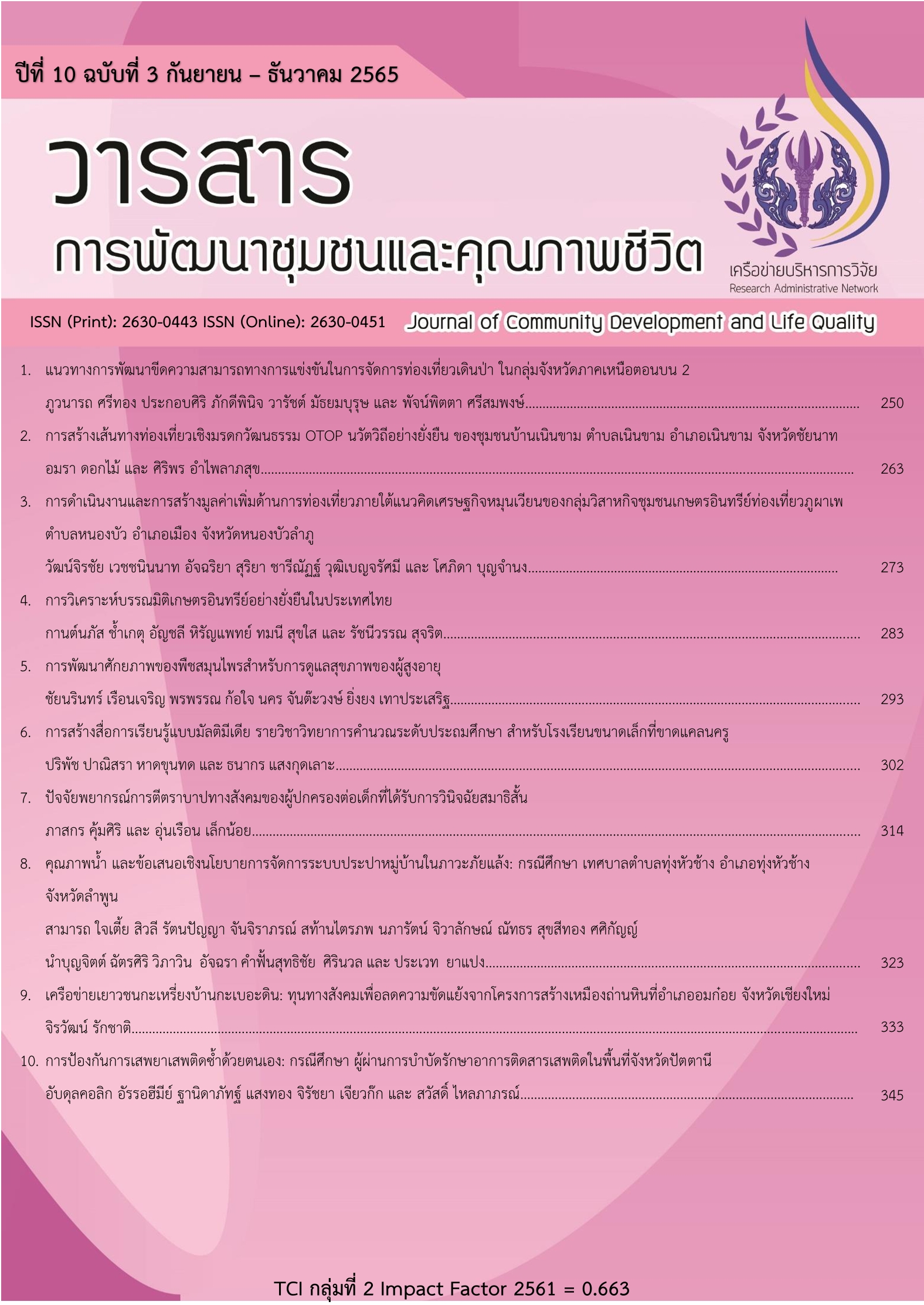ปัจจัยพยากรณ์การตีตราบาปทางสังคมของผู้ปกครอง ต่อเด็กที่ได้รับการวินิจฉัยสมาธิสั้น
Main Article Content
บทคัดย่อ
การศึกษานี้มีจุดประสงค์เพื่อสำรวจระดับการตีตราบาปทางสังคมและปัจจัยพยากรณ์การตีตราบาปทางสังคมของผู้ปกครองต่อเด็กที่ได้รับการวินิจฉัยสมาธิสั้น ใช้วิธีการศึกษาเชิงสำรวจแบบภาคตัดขวางโดยเก็บข้อมูลด้วยแบบสอบถามระหว่างเดือนมิถุนายนถึงกรกฎาคม พ.ศ. 2561 ประชากรเป็นผู้ปกครองนักเรียนในโรงเรียนทั่วกรุงเทพมหานคร ทำการสุ่มอย่างง่ายได้ทั้งหมด 4 โรงเรียน เป็นกลุ่มตัวอย่างจำนวนทั้งสิ้น 400 คน แบบสอบถามประกอบด้วยข้อมูลทั่วไป การตีตราบาปทางสังคม เจตคติ และการสนับสนุนทางสังคม วิเคราะห์ข้อมูลด้วยสถิติพรรณนา ได้แก่ ความถี่ ร้อยละ ค่าเฉลี่ย ส่วนเบี่ยงเบนมาตรฐานเพื่ออธิบายปัจจัยต่าง ๆ และศึกษาปัจจัยพยากรณ์ด้วยการวิเคราะห์การถดถอยเชิงพหุ ผลการศึกษาพบว่าการตีตราบาปทางสังคมต่อเด็กสมาธิสั้นอยู่ในระดับน้อยทั้งภาพรวมและรายด้าน สำหรับปัจจัยที่สามารถพยากรณ์การตีตราบาปทางสังคมต่อเด็กสมาธิสั้น ได้แก่ เจตคติด้านอารมณ์ความรู้สึกเชิงลบ และการสนับสนุนทางสังคม โดยปัจจัยที่มีอำนาจพยากรณ์มากที่สุด คือ เจตคติด้านอารมณ์ความรู้สึกเชิงลบ ( = 0.20) รองลงมาคือการสนับสนุนทางสังคม (
= -0.19) ซึ่งปัจจัยทั้งสองตัวร่วมกันพยากรณ์การตีตราบาปทางสังคมต่อเด็กที่ได้รับการวินิจฉัยสมาธิสั้นได้ร้อยละ 9.8 อย่างมีนัยสำคัญที่ระดับ 0.05 ทั้งนี้ผลการศึกษาสามารถนำมาวางแผนป้องกันการตีตราบาปทางสังคมต่อเด็กที่ได้รับการวินิจฉัยโรคสมาธิสั้นได้
Article Details

อนุญาตภายใต้เงื่อนไข Creative Commons Attribution-NonCommercial-NoDerivatives 4.0 International License.
กองบรรณาธิการขอสงวนสิทธิ์ในการตรวจและแก้ไขบทความที่เสนอเพื่อตีพิมพ์ในวารสารการพัฒนาชุมชนและคุณภาพชีวิต
บทความหรือข้อความคิดเห็นใด ๆ ที่ปรากฏในวารสารการพัฒนาชุมชนและคุณภาพชีวิต เป็นวรรณกรรมของผู้เขียนโดยเฉพาะคณะผู้จัดทำไม่จำเป็นต้องเห็นด้วย และไม่ใช่ความรับผิดชอบของมหาวิทยาลัยและคณะผู้จัดทำ / บรรณาธิการ
เอกสารอ้างอิง
Bisset, M., L. Winter, C.M. Middeldorp, D. Coghill, N. Zendarski, M.A. Bellgrove and E. Sciberras. 2022. Recent attitudes toward ADHD in the broader community: A systematic review. Journal of Attention Disorders 26(4): 537-548.
Boontanon, N. 2021. Collaborative Governance at the District-level for Quality of Life Development: A Case Study of Laem Sing District, Chanthaburi Province. Journal of Community Development and Quality 9(2): 289-299.
Corrigan, P.W. and D. Rao. 2012. On the self-stigma of mental illness: Stages, disclosure, and strategies for change. Canadian Journal of Psychiatry 57(8): 464-469.
Chang, C.C., Y.M. Chen, R.C. Hsiao, W.J. Chou and C.F. Yen. 2021. Affiliatestigma in caregivers of children with attention-deficit/hyperactivity disorder: The roles of stress-coping orientations and parental child-rearing styles. International Journal of Environment Research and Public Health 18(17): 9004, doi: 10.3390/ijerph18179004.
Chang, C.C., Y.M. Chen, T.L. Liu, R.C. Hsiao, W.J. Chou and C.F. Yen. 2020. Affiliate stigma and related factors in family caregivers of children with attention-deficit/hyperactivity disorder. International Journal of Environment Research and Public Health 17(2): 576, doi: 10.3390/ijerph17020576.
Hongtiyanon, T. and Tipawong, A. 2018. Relationships between Social Support and Quality of Life in Schizophrenia Patients. Journal of The Royal Thai Army Nurses 19: 487-494. (in Thai)
Klongdee, K., P. Nintachan and S. Sangon. 2016. Factors related to parenting stress in caregivers of children with attention deficit/hyperactivity disorder. The Journal of Psychiatric Nursing and Mental Health 30(1): 52-68. (in Thai)
Koomsiri, P. 2018. Relationship between public stigma, attitudes, and social supports in children with attention deficit hyperactivity disorder (ADHD). Proceeding of the 2018 Krirk's National Academic Conference, September, 29 2018: 1,219-1,233. Krirk University, Bangkok. (in Thai)
Koomsiri, P. and U. Leknoi. 2017. Review article: Attention deficit hyperactivity disorder (ADHD) and public stigma. Journal of Preventive Medicine Association of Thailand 7(3): 302-311. (in Thai)
Lebowitz, M.S. 2016. Stigmatization of ADHD: A developmental review. Journal of Attention Disorder 20(3): 199-205.
Mason, E.K. and P. Varma. 2021. A study on the influence of Thai cultural factors on attitudes and perceptions of ADHD. Scholar: Human Sciences 13(2): 270-285.
Mastoras, S.M., D.H. Saklofske, V.L. Schwean and E.A. Climie. 2018. Social support in children with ADHD: An exploration of resilience. Journal of Attention Disorders 22(8): 712-723.
Ngarmyarn, A. 2011. Due to the formula of Yamane. Business Administration Journal. 34(131): 46-60. (in Thai)
Pattanasombutsook, M. 2021. Validation of Nursing Research Reports and Proper Use of Social Science Research Instruments in Publishing. The Southern College Network Journal of Nursing and Public Health 8(2): 189-204. (in Thai)
Puttisri, S., P. Punpanich, T. Pantungtong and M. Sungprasit. 2006. A depression in mothers of children with ADHD. Journal of Psychiatry Association of Thailand 51(3): 213-223. (in Thai)
Visanuyothin, T., C. Pavasuthipaisit, P. Wachiradilok, P. Arunruang and T. Buranasuksakul. 2013. The prevalence of attention deficit/hyperactivity disorder in Thailand. Journal of Mental Health of Thailand 21(2): 66-75. (in Thai)


